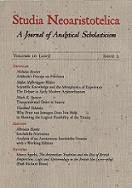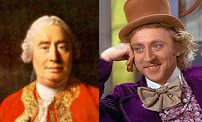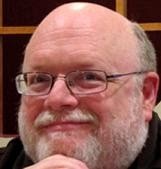In previous posts I’ve critically examined, from a Scholastic point of view, some of Descartes’ best-known arguments. Specifically, I’ve commented on Descartes’ “clear and distinct perception” argument for dualism, and his “trademark” argument for God’s existence. We’ve seen how these arguments illustrate how Descartes, though the father of modern philosophy, in some respects continues to be influenced by the Aristotelian-Scholastic tradition, even as in other respects he abandons it. It’s the novelties, I have suggested, that get him into trouble. This is evidenced once again in what is sometimes called his “preservation” argument for God’s existence. The argument is presented in Meditation III (specifically, in paragraphs 28-36 of the version linked to), in the context in which he presents the “trademark” argument. It is not clearly set off from that argument, and has perhaps gotten even less attention from commentators. But then, as André Gombay notes in his book Descartes, “in the history of God’s proofs, Meditation Three is not a significant event” (p. 54). While the “trademark” argument makes use of Scholastic notions and the “preservation” argument is not completely dissimilar to earlier arguments for a divine First Cause, both arguments are nevertheless idiosyncratic, reflecting the epistemological situation Descartes has put himself in in the first two Meditations. It is no surprise, then, that they did not catch on with later modern philosophers who did not completely share Descartes’ approach to epistemology. Nor, given the significant philosophical differences between Descartes and the Scholastics, is it surprising that his proofs were not appealing to thinkers who remained within the Scholastic tradition. The arguments were perhaps destined to be orphans. By the beginning of Meditation III, Descartes knows I think, therefore I am, but he has yet to establish that anything else exists. That God created him with the faculties he has and is not a deceiver is going to be his key to regaining knowledge of the external world, but how is he going to prove that God exists? He cannot do so via arguments like Aquinas’s Five Ways, since they begin with premises that appeal to observation, and Descartes does not yet know as of Meditation III whether his senses are reliable. If he is going to establish God’s existence, then, he is going to have to do so on the basis of what he does know, viz. that he exists and that he has various ideas. The “trademark” argument begins with the second of these bits of knowledge, specifically with the fact that he finds within himself the idea of God. The “preservation” argument starts with the first, the fact that he exists.
Granted that (as the Cogito shows) I exist, Descartes asks, what caused me to exist? Of course, the natural answer would be to say that his parents did, but as of Meditation III Descartes still does not know whether his parents or anything else about his previous life is real. But what Descartes is concerned with in any event, as he goes on to make clear, is what conserves him in existence here and now and at any moment. What causes him to keepexisting, instead of being annihilated? His parents cannot be the answer to that question, and it is a question that arises however long he’s existed and whether or not the material side of his nature, or indeed the material world as a whole, turns out to be real. Sounding not unlike Aquinas, Descartes writes:
In truth, it is perfectly clear and evident to all who will attentively consider the nature of duration, that the conservation of a substance, in each moment of its duration, requires the same power and act that would be necessary to create it, supposing it were not yet in existence; so that it is manifestly a dictate of the natural light that conservation and creation differ merely in respect of our mode of thinking [and not in reality].
Now “creation,” as that is understood in traditional theology, is causing the existence of a thing in its entiretyrather than merely modifying pre-existing materials. It is creation out of nothing, and it is for the Scholastic what God does in the act of conserving the world in being, not merely something he did at some beginning point in time. Descartes is thinking of creation in similar terms, his point being that causing a thing’s sheer existence out of nothing at any particular point in its lifespan -- that is, conserving it in being -- is for purposes of the question at hand in no relevant respect different from having created it out of nothing at the time of its origination.
So, what is the cause of his being preserved in existence at any moment? Is he is own preserving cause? Is something other than him but still non-divine the cause? Or is it God? Descartes argues that the first two answers cannot be right, leaving the third as the only remaining possibility. One way to summarize the reasoning is as follows:
1. I am preserved in existence or continuously created out of nothing at every instant.
2. Causing the sheer existence of a thing out of nothing requires greater power than causing any other perfection does.
3. So if I were preserving or creating myself out of nothing, I could also cause myself to have any perfection, including the perfections characteristic of the divine nature.
4. But if I could give myself the divine perfections, I would have done so, and yet I have not.
5. And since I am a thinking thing, I would be aware of creating myself out of nothing if I were doing so, and I am not aware of doing so.
6. So I am not preserving or continuously creating myself out of nothing.
7. Anything that is preserving or continuously creating me must, like me, be a thinking thing, since there cannot be less reality in the cause than in the effect.
8. Since any possible non-divine preserving cause of my continued existence also lacks the divine perfections, it could not be the preserving cause of its own existence either.
9. The only thing that could terminate this regress of preserving causes is something which does have all the divine perfections, which would be God himself.
10. So God exists.
What should we think of this argument? Let me begin by noting three objections which are, in my view, no good. First, it might be suggested that the continued existence either of the Cartesian subject or of anything else requires no cause at all. One basis for this claim might be a rejection of the principle of causality, which says (in what I take to be the most fundamental formulation) that a potential that is actualized must be actualized by something already actual. But there are no good objections to the principle of causality and decisive arguments in its favor, as I have argued in several places and argue at greatest length in chapter 2 of Scholastic Metaphysics. Another basis for the claim might be the suggestion that though the generation of a thing requires a cause, its continued existence at any moment does not. This would be an appeal to what has sometimes been called “existential inertia,” the notion that in general a thing will just continue to exist unless something positively acts to destroy it, without its requiring any positive causal action to conserve it. But there are no good reasons to believe in existential inertia, and decisive reasons for rejecting it, as I argue in my ACPQ article “Existential Inertia and the Five Ways.” A second objection might be that there is no reason to think a regress of preserving causes would have to terminate in a first cause, divine or otherwise. But such a series would be what Scholastic metaphysicians call an essentiallyordered (as opposed to an accidentallyordered) series of causes, and the former sort of series (unlike the latter) must have a first member. More precisely, for such a series to exist there must be a cause which is “first,” not in the sense of standing at the head of a queue, but rather in the sense of having underived or intrinsic causal power, since everything else in the series has only derivative or “secondary” causal power. I have expounded and defended this idea in several places, once more at greatest length in Scholastic Metaphysics.
A third objection would be to reject the principle (appealed to in step 7 of the argument above) that what is in the effect must in some way be in the cause. Commentators on Descartes call this the Causal Adequacy Principle and Scholastic metaphysicians call it the Principle of Proportionate Causality. I have defended this principle too in several places, and (yet again) at greatest length in Scholastic Metaphysics.
In short, these objections are directed at aspects of Descartes’ argument that it has in common with Scholastic arguments for God’s existence, and those aspects are in my view all sound. So if these were the only objections that could be raised against Descartes, the argument would in my view succeed. However, those are not the only possible objections, and the argument is seriously problematic in other ways -- in particular, it is problematic precisely in those respects in which it departs from Scholasticism.
Implicit in Descartes’ argument is the idea that a thing might be the cause of its own existence, and indeed that God is the cause of his own existence. Now this notion of a causa sui is one that Scholastics like Aquinas explicitly reject, and for good reason since it is incoherent. (It is sometimes suggested that science, or at least science fiction, shows otherwise, but as I have argued elsewhere, such suggestions are confused about what is being ruled out when one rules out the notion of a causa sui.) But when Descartes considers the proposal that he might be his own cause, he doesn’t say: “No, because self-causation is impossible” --as, in the Scholastic view, he should have said. Rather, he says: “No, because if something could cause itself to exist, it could also cause itself to be God, and I haven’t done that.” Now the conditional appealed to here -- that ifsomething could cause its own existence thenit could also give itself the divine attributes -- is one for which Descartes gives an interesting argument. The argument is that causing something to exist out of nothing requires greater power than causing any other attribute. That is certainly plausible, because to cause a thing to have some attribute is merely to modify some pre-existing substance, whereas to cause a thing to exist ex nihilo is to cause the substance itself together with its attributes, and not merely to add something to the already existing substance. And substances are, metaphysically speaking, more fundamental than attributes. So, if you could cause the sheer existence of a substance ex nihilo, then surely you could, Descartes with at least some plausibility holds, also cause it to be omniscient, or omnipotent, or omnipresent, or indeed to have all the divine attributes together. And thus, if you could cause yourself to exist ex nihilo then you could cause yourself to be God.
The trouble is that the antecedent of this conditional is false. Nothing can cause itself in the first place, so the whole idea of something causing itself to be God is just a non-starter. But Descartes not only does not reject the antecedent, he makes it essential to his whole argument. For the way he gets to his conclusion is by way of the idea that there is and must be something that causes itself, only it cannot be you, me, or any other non-divine thing but has to be God, since a self-causing being would be one that causes itself not only to exist but also to be omnipotent, omniscient, etc.
From a Scholastic point of view, this is, metaphysically speaking, just a complete mess. To be sure, there is for the Scholastic a sense in which God is self-explanatory, insofar as that which is pure actuality, being itself, and absolutely simple must also be absolutely necessary. God’s existence is in that way explained or made intelligible by his nature. He is by no means an unintelligible “brute fact.” But that is very different from being self-caused, in the sense of being the efficient cause of one’s own being. That, again, is for the Scholastic simply incoherent. (Notice that to be the efficient cause of a thing is not the same thing as to be the explanation of a thing. An appeal to an efficient cause is merely one type of explanation among others.) And it certainly makes no sense whatsoever to think of God somehow imparting to himself omnipotence, omniscience, or any other attribute -- as if he could in principle have existed without these attributes, but decided not to.
Why would Descartes proceed in this bizarre fashion? After all, existing Scholastic arguments would have gotten him to a divine conserving cause without appealing to the notion of self-causation, and that he starts with his own existence as a Cartesian subject rather than with the preservation in existence of ordinary material objects would make no difference. A Cartesian subject may not be material, but it is still a compound of essence and existence and thus a compound of potency and act. And that is all one needs to get an argument for a conserving cause going. Descartes even makes use of the language of potency and act earlier in this very Meditation. So why not just go the whole hog and adopt an Aquinas-style argument for the purposes of Meditation III?
The answer, perhaps, is just that while Descartes does not entirely abandon the Scholastic metaphysical apparatus, he wants to make as little use of it as possible, especially where it is closely tied to the Aristotelian-Scholastic philosophy of nature that he is very keen to overthrow. And the traditional Scholastic arguments for divine conservation of the world are definitely tied to that philosophy of nature. (As I argued in my lecture at Franciscan University of Steubenville some time back, I think you are not going to get from the natural world to God unless you make use of the theory of act and potency.) So, though for the purposes of arguing for God’s existence he could have narrowed his application of the key metaphysical concepts to the Cartesian subject and kept them out of his philosophy of nature, perhaps he thought it better just to make a clean break and try a new approach. But this is speculation on my part. Here’s another interesting fact about Descartes’ argument. Like the better-known versions of the First Cause argument, Descartes’ version does not amount to the stupid straw man: “Everything has a cause, so the universe has a cause.” However, Descartes is arguably committed to the claim that “everything has a cause” -- not as a premise of the argument (he doesn’t explicitly say in Meditation III that everything has a cause) so much as an implication of it. For he’s argued that the continued existence of any thinking thing has to be traced to the causal activity of a thinking thing which gives itself the divine attributes. He also regarded non-thinking or extended things as having a divine sustaining cause as well. So, everything other than God has a cause on Descartes’ view. But he also characterizes God as a causa sui. So God has a cause too, namely himself. So, Descartes’ argument seems to imply, everything has a cause.
This does not make Descartes subject to the standard atheist retort to the straw man First Cause argument, though. That retort is summed up in a remark made by Bertrand Russell in Why I Am Not a Christian:
If everything must have a cause, then God must have a cause. If there can be anything without a cause, it may just as well be the world as God, so that there cannot be any validity in that argument. (pp. 6-7)
Now in response to this a Scholastic would say: “We never said ‘everything has a cause’ in the first place; in fact we deny that. You’re attacking a straw man. Furthermore, there is nothing whatsoever arbitrary in saying that things other than God require a cause while he does not. For what makes something in need of a cause is that it has potentials which need to be actualized, or is metaphysically composite and is in need of a principle to account for how its parts are conjoined, or has an essence distinct from its act of existence and thus has to acquire its existence from something other than its own nature. This is true of the material universe and every part of it. However, what is pure actuality devoid of potentiality, or absolutely simple and without any parts, or has existence itself as its very essence, not only need not have a cause but could not have had one. There might be other objections one could raise against First Cause arguments, but Russell’s objection just completely misses the point.”
Descartes, however, might reply instead as follows: “But God does have a cause. I’m not making any exception for him. It’s just that he is his own cause, whereas other things are caused to exist by things distinct from themselves. Nor is there anything arbitrary in my saying that God causes himself while other things do not. For the reason I say that they do not cause themselves is that anything that causes itself to exist would also cause itself to have the divine attributes and thus would cause itself to be God, and neither the universe nor any part of it has done that. Only God himself, naturally, has done that. There might be other objections one could raise against this argument, but Russell’s objection just completely misses the point.”
Descartes’ “preservation” argument is also interesting, then, for what it tells us about vulgar criticisms of First Cause arguments, like Russell’s. For Russell’s objection is so very feeble that it fails even as a response to Descartes’ crazy version of the argument! That’s some kind of achievement.


















.jpg)